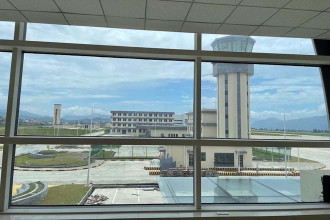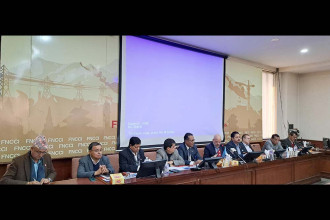-1744085047.jpeg)
- Bridging the Gap to International Qualifications
Across South Asia, including Nepal, more and more students are dreaming of international qualifications. They see them as a ticket to good education, valuable connections around the world, and better career opportunities. However, the dream to study abroad is difficult for many students. For some, managing the finances could be a hassle and at times getting a visa can be a tricky issue. Besides these two major problems there are other obstacles too. And it is exactly here that Transnational Education (TNE) can come in as a boon. It is a really promising solution, bringing world-class education right to students in their own countries. This makes it more affordable and flexible, all while keeping those international standards high.
Think of TNE as education without borders. Students can access learning from other countries without having to pack their bags and move. This can take different forms, like online courses, partnerships with local colleges, or even branch campuses of international universities. The UK has been a real pioneer in TNE, with over half a million students around the globe enrolled in UK university programmes outside of the UK in 2022-23.
-1744085047.jpeg)
-1744085047.jpeg)
In Nepal, though, not everyone knows about TNE yet. Most students still set their sights on going abroad for their studies. But, like we've seen in other South Asian countries, there's a growing buzz about getting globally recognised qualifications without leaving home. UK TNE partnerships in the region are a great example, with over 97,000 students in 2022-23. This shows that people are starting to see the real advantages of this approach. If TNE is done well, it could give Nepali students access to high-quality international education while keeping them connected to their communities.
South Asia is a region with a huge population – over 1.9 billion people – and a lot of young people. This means there's a big challenge to provide enough places in higher education. Nepal, like its neighbours, struggles with having enough university spots, outdated courses, and not enough connection between what students learn and what businesses need.
-1744085047.jpeg)
-1744085829.jpeg)
TNE can help bridge these gaps by bringing global expertise to local institutions. UK universities are known for their well-rounded approach to learning, strong focus on research, and close ties with industry. By bringing these elements to Nepal through TNE, we can encourage new ideas, help students get better jobs, and strengthen the country's knowledge-based economy.
Plus, TNE helps local universities grow stronger. By partnering with universities from other countries, local institutions can benefit from faculty training, joint research projects, and updated courses. This all adds up to better quality higher education in Nepal, making it more competitive on the world stage.
TNE also plays a vital role in reaching the United Nations' Sustainable Development Goals (SDGs), especially when it comes to providing good quality education for everyone (SDG 4). A 2022 report by the British Council on TNE partnerships- ‘Value of TNE Partnerships Report’ showed that international education collaborations have had a positive impact on access to quality education, economic growth and reducing inequality.
By making high-quality education available right in Nepal, TNE helps level the playing field for students from different backgrounds. It allows students who might not have the money to study abroad to still get an international degree. TNE also supports lifelong learning and skill development by offering flexible study options, like online and part-time courses.
TNE partnerships also help promote equality between men and women (SDG 5) by creating more opportunities for women to get higher education, as they often face more social and cultural barriers to studying abroad. What's more, when universities in Nepal work with institutions from other countries, it encourages research and innovation, which contributes to Nepal's overall sustainable development.
One of the biggest problems Nepal faces is that many of its brightest students leave the country every year to get higher education and find better jobs. In 2021, data showed that one in five Nepali students went overseas for their education, and this trend is still growing.
TNE offers a way to keep that talent in Nepal by allowing students to earn qualifications that are recognised around the world without having to leave. This not only keeps skilled people in the country but also encourages what's called 'brain circulation.' This is where students gain international experience through TNE and then bring their knowledge back to help Nepal's economy grow. By making sure TNE programmes are relevant to what local industries need, Nepal can create a skilled workforce ready to drive innovation and economic progress.
On top of that, TNE helps build global professional networks, research partnerships, and opportunities for starting businesses. This makes sure that the knowledge gained benefits Nepal. Stronger TNE partnerships will help Nepal develop a strong higher education system, reducing the need for students to look for opportunities elsewhere.
Countries like India and Sri Lanka are already making changes to their higher education policies to encourage TNE collaborations. India's National Education Policy (NEP) 2020 specifically talks about internationalisation, allowing foreign universities to set up campuses and work with local institutions. The University of Southampton, from the UK, has already started operating in India, which is a big step forward for TNE in the region.
Nepal can also use similar policies to strengthen its TNE sector. By creating an environment that's welcoming to foreign institutions, the government can attract them to partner with Nepali universities. This will improve the quality and accessibility of education. Encouraging joint degree programmes, research collaborations, and opportunities for teachers and students to exchange ideas will further boost the benefits of TNE in Nepal.
TNE has the potential to change higher education in Nepal by making global qualifications accessible, strengthening local universities, and reducing the brain drain. With smart policy changes and more awareness, Nepal can use TNE to build a competitive, knowledge-driven economy. As South Asia embraces transnational education, Nepal needs to seize this opportunity to shape its higher education system for a brighter future.






